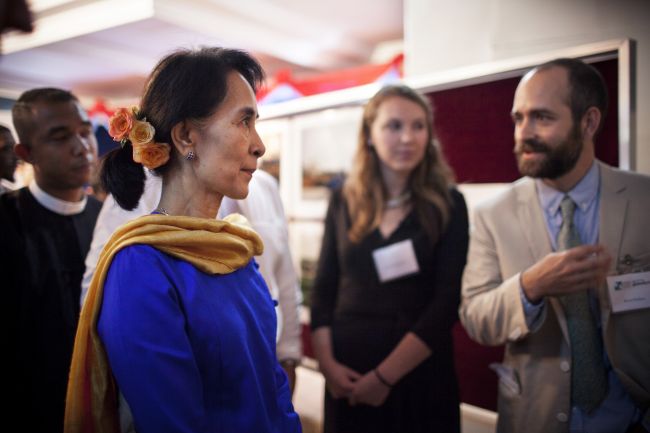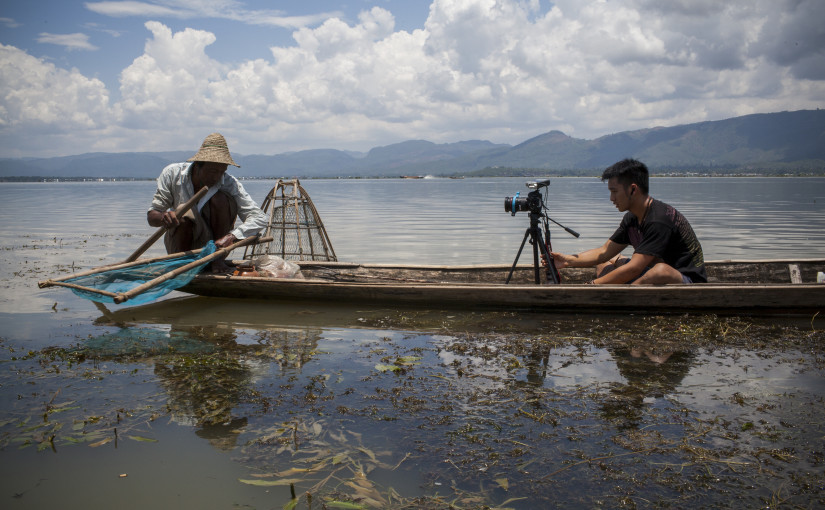By: Kevin D. Grant
Co-founder and Managing Editor, The GroundTruth Project
The atmosphere in Cairo felt tumultuous and uncertain in October 2011. The popular uprising that had forced out longtime dictator Hosni Mubarak had subsided, catching its breath and contemplating the way forward. The Egyptian military held firm control of the country and activists warned that a revolution hadn’t actually happened yet.
But powerful currents of optimism ran through the room as 17 emerging journalists — eight American and nine Egyptian — gathered at the Cairo Marriott with a team of editors and facilitators for a reporting fellowship that changed lives.
As the 17 reporting fellows first sat together to share their experiences of the Arab Spring — whether from the streets of Cairo or from computer screens in the United States — the energy in the room was electric. Many of the Egyptian journalists relayed harrowing stories of tear gas-soaked protests while the Americans described watching from afar and longing to be closer to the action. To be in Cairo was an American reporter’s dream come true. The Egyptian reporters shared that the reality had been both exhilarating and exhausting.
The Open Hands Initiative (OHI), working with the GlobalPost team that later founded The GroundTruth Project, made the trip possible. Together we created an intense, immersive reporting project we called “Covering a Revolution” to bring together journalists of different backgrounds to collaborate and learn from one another as part of what OHI calls “people-to-people democracy,” connecting ordinary citizens of various countries in meaningful ways to engage in dialogue, foster understanding and cultivate international friendship.
When we saw young American journalists working alongside local colleagues in Egypt and then Burma, we realized this produced extraordinary results. An American spirit of inquiry combined with the local knowledge of reporters from the countries we were covering yielded excellent journalism.
As Charles Sennott, founder and executive director of The GroundTruth Project remarked, “OHI’s philosophy of people-to-people diplomacy transformed us. When we saw young American journalists working alongside local colleagues in Egypt and then Burma, we realized this produced extraordinary results. An American spirit of inquiry combined with the local knowledge of reporters from the countries we were covering yielded excellent journalism. We owe [founder and chairman of OHI] Jay Snyder and OHI for that insight.”
We at GroundTruth, now a 501(c)(3) nonprofit that trains the next generation of correspondents, agree with the idea that everyday people make great diplomats. At a time when the journalism industry is in flux and supportive opportunities for journalists remain scarce, GroundTruth is proud to work with similarly minded organizations like OHI to create experiences that foster a culture of safety and respect while producing meaningful journalism that leads to top jobs for our fellows.
The Cairo fellows underwent a seminar with leading voices in academia, politics and advocacy, received situational awareness training, and reported in different parts of Egypt to produce a GlobalPost Special Report that featured stories on some of the most compelling aspects of the uprising: A generation of activists who used social media to mobilize real-world action, an authoritative account of Egyptian security forces’ deadly attack on demonstrators at the Maspero media building, a profile of a young woman who dared to challenge the Egyptian military for “virginity tests” performed on demonstrators, and many more. Several of the journalists were named finalists for the Livingston Award, considered the Pulitzer Prize for young journalists.
Fellows went on to earn full-time positions at BBC, Bloomberg, NPR, Huffington Post, and with us at The GroundTruth Project.

Two years later, GroundTruth again teamed up with OHI to produce a similarly transformative experience in Myanmar, also known as Burma. A team of Burmese and American journalists fanned out across a country in transition as part of a reporting experience that culminated in a press conference featuring the imprisoned dissident-turned-stateswoman Aung San Suu Kyi. Fellows in that program earned full-time roles at The New York Times, CBS News, Politico, and American Public Media.
We believe that the future of journalism is collaborative.
We believe that the future of journalism is collaborative. While the traditional media model values cutthroat competition and “scoops” above all else, the digital model values a team of complementary players contributing skills and resources. Some of the most important reporting in the world today is happening as a collaboration between organizations.
For example, last year the nonprofit International Center of Investigative Journalists (ICIJ) created a coalition of news entities including GroundTruth for an award-winning series called “Evicted and Abandoned: The World Bank’s Broken Promise to the Poor.” ICIJ employed a similar model for the now world-renowned Panama Papers investigation, which has changed the public understanding of how our global financial system really works.
Undertaking a major international project like those OHI and GroundTruth developed in Egypt and Burma depends on local and foreign correspondents and editors working together to get stories right — and doing so in a way that ensures the safety of journalists and sources alike.
As financial challenges and technological disruption have contributed to increased vulnerability for journalists around the world, GroundTruth has helped push forward a new initiative called A Culture of Safety (ACOS) Alliance, now endorsed by more than 90 top organizations.
The news industry does not look likely to stabilize anytime soon. Change is the new normal. But working together gives us the best chance to do important work and change lives. So as we strive to do our part in training the next generation, we’ll always take every measure to do so safely and collaboratively.
About the Author: Kevin Douglas Grant is The GroundTruth Project’s Co-founder and Managing Editor. Previously Senior Editor of Special Reports at GlobalPost, he edits award-winning coverage on global religion and youth unemployment among others. He holds an M.A. in Online Journalism from the University of Southern California’s Annenberg School, where he was a Dean’s Scholar and the founding Executive Editor of Annenberg’s thriving 24/7 news organization Neon Tommy. Grant is the former Operations Director of semantic news analyzer Inform.com.
Photo Credit (Header Image): “Myanmar Telling Its Own Story” reporting fellow Johnny Wu films a Burmese fisherman on Inle Lake in 2013. (Natalie Keyssar/GroundTruth)
